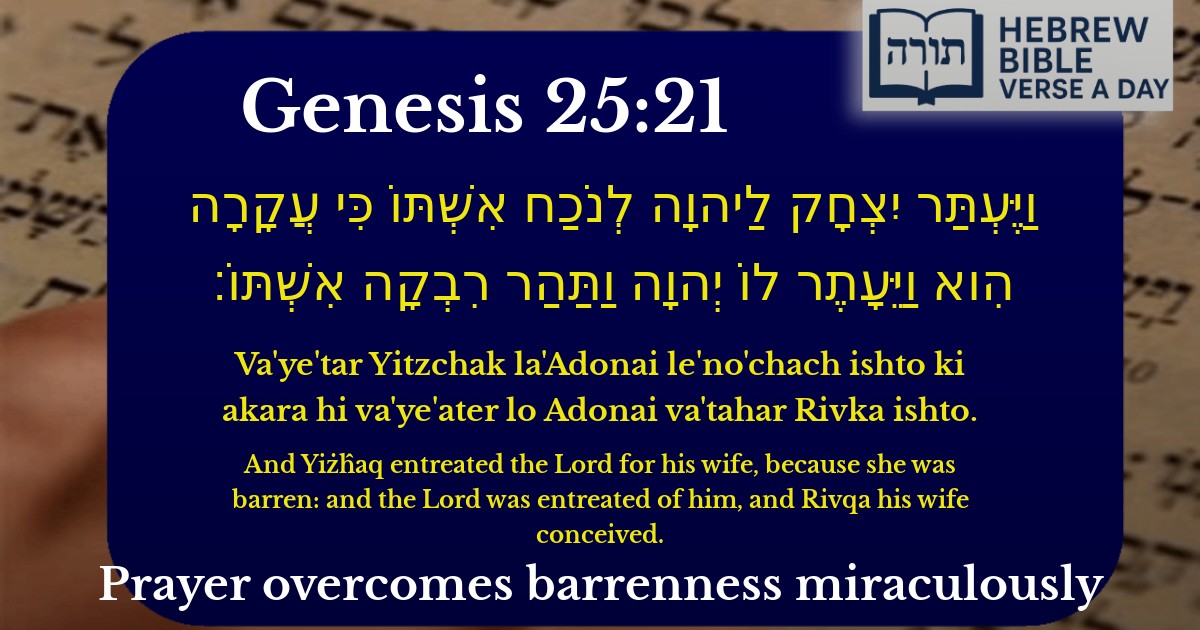Join Our Newsletter To Be Informed When New Videos Are Posted
Join the thousands of fellow Studends who rely on our videos to learn how to read the bible in Hebrew for free!
Hebrew Text
וַיֶּעְתַּר יִצְחָק לַיהוָה לְנֹכַח אִשְׁתּוֹ כִּי עֲקָרָה הִוא וַיֵּעָתֶר לוֹ יְהוָה וַתַּהַר רִבְקָה אִשְׁתּוֹ׃
English Translation
And Yiżĥaq entreated the Lord for his wife, because she was barren: and the Lord was entreated of him, and Rivqa his wife conceived.
Transliteration
Va'ye'tar Yitzchak la'Adonai le'no'chach ishto ki akara hi va'ye'ater lo Adonai va'tahar Rivka ishto.
Hebrew Leining Text
וַיֶּעְתַּ֨ר יִצְחָ֤ק לַֽיהֹוָה֙ לְנֹ֣כַח אִשְׁתּ֔וֹ כִּ֥י עֲקָרָ֖ה הִ֑וא וַיֵּעָ֤תֶר לוֹ֙ יְהֹוָ֔ה וַתַּ֖הַר רִבְקָ֥ה אִשְׁתּֽוֹ׃
וַיֶּעְתַּ֨ר יִצְחָ֤ק לַֽיהֹוָה֙ לְנֹ֣כַח אִשְׁתּ֔וֹ כִּ֥י עֲקָרָ֖ה הִ֑וא וַיֵּעָ֤תֶר לוֹ֙ יְהֹוָ֔ה וַתַּ֖הַר רִבְקָ֥ה אִשְׁתּֽוֹ׃
🎵 Listen to leining
Parasha Commentary
📚 Talmud Citations
This verse is quoted in the Talmud.
📖 Yevamot 64a
The verse is cited in a discussion about the efficacy of prayer for barrenness, illustrating how Isaac's prayer for Rebecca was answered.
📖 Rosh Hashanah 17b
The verse is referenced in the context of discussing God's responsiveness to the prayers of the righteous.


The Power of Yitzchak's Prayer
Rashi (Bereshit 25:21) explains that the phrase "וַיֶּעְתַּר יִצְחָק" ("And Yitzchak entreated") uses an unusual verb form to teach that Yitzchak prayed intensely and repeatedly before Hashem. The word עתר is related to the term for a pitchfork (עֲתַר), symbolizing how Yitzchak's prayers "overturned" the heavenly decree of barrenness, just as a pitchfork overturns grain.
Praying "לְנֹכַח אִשְׁתּוֹ" – Facing His Wife
The Midrash (Bereshit Rabbah 63:5) notes that Yitzchak stood in one corner and prayed while Rivka stood in another corner, emphasizing their joint spiritual effort. Ramban (Bereshit 25:21) adds that this phrasing indicates Yitzchak directed his prayers specifically for Rivka's sake, showing his selfless concern for her distress over being childless.
Divine Response to Righteous Prayer
The Talmud (Yevamot 64a) states that Hashem desires the prayers of the righteous, using the same verb (וַיֵּעָתֶר) for both Yitzchak's prayer and Hashem's response. This teaches that when tzaddikim pray earnestly, their words create a reciprocal divine response. The Malbim explains that the conception occurred specifically through Yitzchak's prayers because he was an olah temimah (perfect sacrifice) during the Akeidah, making his prayers uniquely potent.
The Significance of Rivka's Barrenness